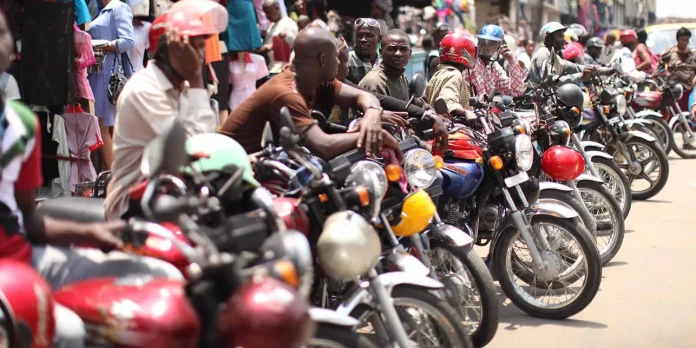Our Terms & Conditions | Our Privacy Policy
Ghana Think Tank IMANI Backs Okada Legalization to Combat Unemployment and Poverty
 Okada Riders
Okada Riders
Ghana’s IMANI Center for Policy and Education, a leading public policy think tank, has endorsed government efforts to formalize commercial motorcycle operations, commonly known as Okada, framing the move as a critical step toward reducing unemployment and alleviating multidimensional poverty.
The proposal, which has sparked national debate, seeks to transform the largely informal sector into a regulated industry capable of delivering broader socioeconomic benefits.
With unemployment hovering around 14%, thousands of Ghanaian youth currently rely on Okada services for livelihoods, despite its illegal status. The sector fills a gap in transportation infrastructure, particularly in urban and peri-urban areas where demand for affordable, flexible mobility remains high. IMANI’s analysis emphasizes that legalization could legitimize these workers while addressing systemic challenges tied to informality, such as exclusion from social safety nets and financial services.
“Legalization is more than an administrative realignment. It represents a proactive strategy to empower vulnerable populations,” IMANI stated in its recent report. The group argues that formalizing Okada operations would require riders to undergo licensing, mandatory training, and periodic vehicle inspections, alongside strict safety protocols like helmet use and age restrictions. Such measures, it contends, would enhance road safety while elevating the trade from subsistence work to a recognized profession.
Beyond safety improvements, IMANI highlights the potential for financial inclusion. Formalization could grant operators access to microfinance, insurance, and social security, enabling investments in better equipment and long-term economic stability. The ripple effects, the report notes, might stimulate ancillary industries including helmet manufacturing, spare parts sales, and specialized training academies thereby boosting local economies.
Critics have raised concerns over road safety risks associated with motorcycle taxis, but IMANI counters that regulation, rather than prohibition, offers a sustainable solution. “Training and proficiency assessments would not only make riders safer but also more competitive in a modernizing economy,” the report asserts.
The think tank ties Okada’s formalization to Ghana’s broader development goals, particularly its agenda to tackle poverty’s multidimensional facets, which span income, health, education, and financial resilience. By integrating informal workers into the formal economy, the policy could serve as a model for similar sectors grappling with invisibility and marginalization.
Ghana’s pursuit of Okada regulation mirrors trends in other African nations, where motorcycle taxis have become lifelines for urban transport. However, success hinges on effective enforcement and stakeholder cooperation, challenges that have historically hampered similar reforms. As debates continue, the government faces pressure to balance economic inclusion with regulatory pragmatism in a sector that embodies both opportunity and complexity.
Send your news stories to newsghana101@gmail.com
Follow News Ghana on Google News
[ad_1]
Images are for reference only.Images and contents gathered automatic from google or 3rd party sources.All rights on the images and contents are with their legal original owners.
[ad_2]



Comments are closed.